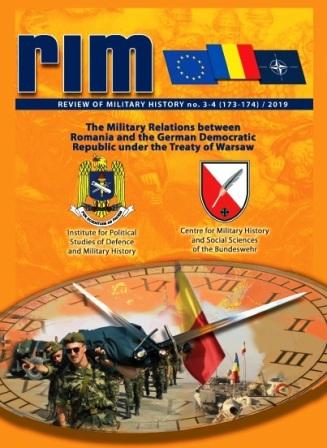Factorul militar în procesul de dezmembrare a granițelor țării (iunie-septembrie 1940). Între cedare și rezistență
The Role of the Military in the Undoing of the Country’s Borders (June-September 1940). Between Surrender and Resistance
Author(s): Petre OtuSubject(s): Diplomatic history, Military history, Political history, Security and defense, WW II and following years (1940 - 1949), Peace and Conflict Studies
Published by: Editura Militară
Keywords: Romania; Bessarabia; Northern Bukovina; ultimatum; Second Vienna Award; Transylvania; 1940;
Summary/Abstract: The study analyses the role of the military in the collapse of the country’s borders in June-September 1940. In this period, Romania found itself isolated, politically and militarily, and the Ribbentrop-Molotov pact (August 23, 1939) placed it at the discretion of the two totalitarian powers – Germany and USSR. The rapid defeat of France in just six weeks (May 10 – June 22, 1940) represented a huge surprise for the Soviet leader Joseph Stalin, who expected a prolonged war, similar to that of 1914-1918. Thus, the Soviet Union kept its forces intact and were in the position to tip the balance of victory on the Western front. The new circumstances allowed Moscow to materialize its old strategic objectives. Stalin decided to act forcefully and, by two ultimatums, he demanded Bessarabia, as stipulated in the Ribbentrop-Molotov pact, and in addition Northern Bukovina, a claim which created the first breach in the German-Soviet friendship. Although Soviet preparations and intentions were well known, the leadership in Bucharest did not have a clear stance on whether to defend or evacuate Bessarabia. Under these circumstances, the army was placed in a humiliating position, being forced to surrender without a fight the territory between Dniester and Prut and Northern Bukovina. In addition, the military leadership (the minister of war and the chief of staff) invoked the unfavourable forces ratio and opted for evacuation. The same situation repeated in the wake of the Vienna Diktat of August 30, 1940, the arguments invoked being once again the difficult military situation and the prospective dissolution of the Romanian state. Again, the army was ordered to evacuate northeastern Transylvania without a fight, but the withdrawal was slightly more organized. While the decision to accept the ultimatums and the diktats was primarily political, the army, despite having a secondary role in this drama, became one of its prime victims. It was put in the position to evacuate without a fight an important part of the national territory. Thus, the leadership opted for the formula ”we cede territories to keep the state” instead of armed resistance, as it would have been the case. The non-combat approach from the summer of 1940 had and still has major consequences over the Romanian psyche.
Journal: Revista de istorie militară
- Issue Year: 2020
- Issue No: 1-2
- Page Range: 5-19
- Page Count: 15
- Language: Romanian

